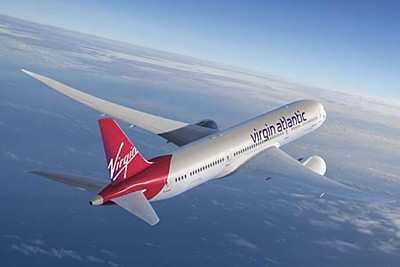Fuel To Be Made From Waste From Steel Mills
It's certainly different from the biofuels that are becoming so
talked about as alternatives to petroleum-based jet fuel. Virgin
Atlantic has formed a partnership with New Zealand-based LanzaTach
to develop the first low carbon aviation fuel with just half the
carbon footprint of the standard fossil fuel alternative.

The companies say the alliance represents a breakthrough in
aviation fuel technology that will see waste gases from industrial
steel production being captured, fermented and chemically converted
using Swedish Biofuels technology for use as a jet fuel. The
revolutionary fuel production process recycles waste gases that
would otherwise be burnt into the atmosphere as carbon dioxide.
Virgin Atlantic plans flights with the new fuel on its routes
from Shanghai and Delhi to London Heathrow within two to three
years as LanzaTech and partners develop facilities in China and
India. The technology is currently being piloted in New Zealand, a
larger demonstration facility will be commissioned in Shanghai this
year, and the first commercial operation will be in place in China
by 2014. Following successful implementation, a wider roll-out
could include operations in the UK and the rest of the world.
LanzaTech estimates that its process can apply to 65 percent of
the world’s steel mills, allowing the fuel to be rolled out
for worldwide commercial use. The energy company believes that this
process can also apply to metals processing and chemical
industries, growing its potential considerably further.
“This partnership to produce a next generation, low-carbon
aviation fuel is a major step towards radically reducing our carbon
footprint, and we are excited about the savings that this
technology could help us achieve," said Sir Richard Branson. "With
oil running out, it is important that new fuel solutions are
sustainable, and with the steel industry alone able to deliver over
15 billion gallons of jet fuel annually, the potential is very
exciting. This new technology is scalable, sustainable and can be
commercially produced at a cost comparable to conventional jet
fuel.”
Virgin Atlantic will be the first airline to use this fuel and
will work with LanzaTech, Boeing and Swedish Biofuels towards
achieving the technical approval required for using new fuel types
in commercial aircraft. A ‘demo’ flight with the new
fuel is planned in 12-18 months.

“This technology will enable airlines to dramatically
reduce their carbon footprint by reusing gases that would otherwise
have been emitted directly into the atmosphere," said Dr Jennifer
Holmgren, Chief Executive of LanzaTech. "It promotes sustainable
industrial growth, as the process enables manufacturing plants to
recycle their waste carbon emissions. While there is still work to
be done and logistical hurdles to cross, we have excellent partners
in Virgin Atlantic, Swedish Biofuels and Boeing and we are
confident that we will have a facility with the capacity to produce
fuel for commercial use by 2014.”
LanzaTech says this next generation technology overcomes the
complex land use issues associated with some earlier generation
biofuels – and detailed analysis suggests the fuel will
produce around a 50% saving in lifecycle carbon emissions. The
Roundtable for Sustainable Biofuels (RSB), the leading
international body to ensure the sustainability of biofuels
production, will advise the team to ensure the fuel produced meets
key environmental, social and economic criteria.
Virgin Atlantic believes that this development will take the
airline well beyond its pledge of a 30% carbon reduction per
passenger km by 2020. The investment in renewable fuels is part of
our wider programme to reduce carbon through measures such as using
new, more fuel-efficient aircraft and supporting a global carbon
cap and trade scheme, through our involvement in Aviation Global
Deal group.
 ANN's Daily Aero-Linx (04.16.24)
ANN's Daily Aero-Linx (04.16.24) Aero-News: Quote of the Day (04.16.24)
Aero-News: Quote of the Day (04.16.24) Airborne 04.10.24: SnF24!, A50 Heritage Reveal, HeliCycle!, Montaer MC-01
Airborne 04.10.24: SnF24!, A50 Heritage Reveal, HeliCycle!, Montaer MC-01 Airborne 04.12.24: SnF24!, G100UL Is Here, Holy Micro, Plane Tags
Airborne 04.12.24: SnF24!, G100UL Is Here, Holy Micro, Plane Tags Airborne-Flight Training 04.17.24: Feds Need Controllers, Spirit Delay, Redbird
Airborne-Flight Training 04.17.24: Feds Need Controllers, Spirit Delay, Redbird




